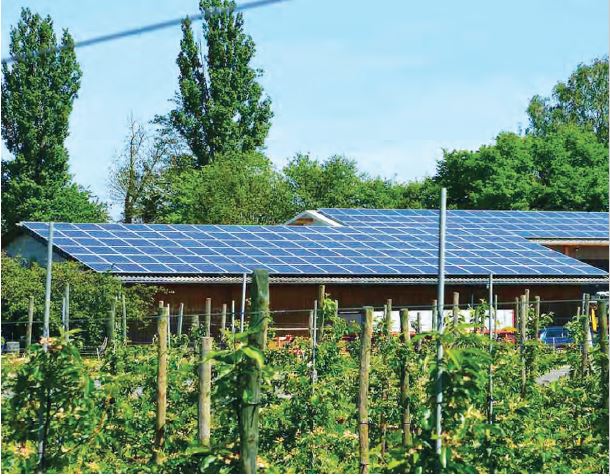 |
|
 |
WEB EXCLUSIVES |
 |
|
| |
| |
 |
| Cover Story
|
 |
 |
| Textiles’ – the word brings up images of beautiful drapes – cotton, silk, chiffon, lace. Whether it is the material draped on the figurine of the lady... |
|
 |
| |
read more... |
 |
|
 |

|
|
Tapping Sustainable Energy Alternatives
|
|
|
The second lead article, which is also focus article, is written by Shri N Bhadran Nair. Citing a report of the World Health Organisation, the author has advocated for tapping sustainable energy alternatives
|

|

|

|

|
|
Financing Renewables in India
|
|
|
The third article is written by Shri P C Maithani, Adviser, Ministry of New and Renewable Energy. He has focussed on renewable energy resources
|

|

|

|
|
Steps to Achieve India’s Solar Potential
|
|
|
The special article is written by Sumant Sinha, Chairman and Managing Director of ReNew Power. He opines that India must also honour its global commitments on curbing greenhouse gas emissions
|

|

|
|
|
 |
|
|
|
|
| |
Political Empowerment of Women and Panchayat Raj
P. SRIVATSA
“Woman is the builder of nation’s destiny. Though delicate and soft as lily, she has a heart, far stronger and bolder than of man. She is the supreme inspiration of man’s onward march”.
Rabindranath Tagore
In the history of human development, woman has been as important as man. In fact the status, employment and work performed by women in society is the indicator of a nation’s overall progress. Without the participation of women in national activities, the social, economic or political progress of a country will be stagnated. The fact is that most of the women’s domestic role is combined with economic activities and utilization of their skill and labour to earn extra income for the family, which makes the family to lead a decent life. Women are regarded as the “better half” of the society and at par with the men. Efforts are being made to realize that women are real “better half” in men’s life. They share abundant responsibility and perform a wide spectrum of duties in running the family, handling the house hold activities like rearing, feeding, attending to farm labour, tending domestic animals and the like, and the most important role now women need to perform more responsibly is her active participation in politics. Political empowerment of women should be one of her prime priorities and the governments and the society must contribute steps in that way to make women participate in the political arena. For that, participation in local self- governments provides initial steps as they are closer to the rural folk. Panchayati Raj Institutions have always been considered as a means to good governance and 73rd Constitutional Amendment was effected in the hope that it would lead to better governance and provide political space to the disadvantaged section of the society like schedule caste, schedule tribes and women. Panchayati Raj Institutions that work as grass–root units of decentralized democratic self-government have been considered as an instrument of socio-economic transformation in rural India. At the local level the 73rd Constitutional Amendment act of 1992 has made two important provisions for the involvement of women in decision making and preparation of plan for development. This Amendment has made a provision that at least one-third of women would be members and chair persons of Panchayats. Involvement of people at the grass-roots level is the most important means of bringing about socio-economic development. Decentralization of power to the Panchayati is seen as a means of empowering people and involving them in decision-making process. Local governments being closer to the people can be more responsive to local needs and can make better use of resources. The democratic system in a country can be ensured only if there is mass participation in the governance. Therefore, to achieve this objective, a system of democratic decentralization popularly known as Panchayati Raj has been introduced in India.
Panchayati Raj was easily accepted because it meant administration by mutual
consultation, consent and consensus. It fitted closely into the ancient cultural
patterns in India. The adoption of the 73rd amendment by the Parliament in 1992
had a great revolutionary potential to create genuine democracy at the
grassroots village level. It represented a historic opportunity to change the
face of rural India. The amendment mandates that resources, responsibility and
decision making power be devolved from central Government to rural grassroots
people through Panchayati Raj Institutions. Their main objective was to realize
Mahatma Gandhi’s dream of reaching power to the people through Panchayats.
Philosophically, Panchayati Raj is a multidimensional idea. It has its
pluralistic definitions and wider connotations in the writings of different
thinkers. Emphasizing the ideology of Panchayati Raj Gandhi viewed,
“India lives in her village. Independence must begin at the bottom, thus making
every village a republic or Panchayati, enjoying full powers". He
particularly envisaged and envisioned the concept of
Gram Swaraj along with
Poorna Swaraj.
Gandhiji
had aptly remarked that independence must begin at the bottom. And it is to
emphasise that women’s empowerment should also start from the villages, the
grass-root level units.
Political Empowerment of Women:
Empowerment of women in all spheres and in particular the political sphere is
crucial for their advancement and for the foundation of gender equal society. It
is central to the goals of equality, development and peace. The Indian democracy
which is more than half a century old has entered the next century. But a large
mass of women are kept out of political arena still. There can be no true
democracy, or no true people’s participation in governance and development
without equal and proportional participation of men and women at different
levels of decision making. Participation of women in political life is integral
to the advancement of women. A general acuity in societies around the world is
that women’s major role is to cook food, take care of the children and the
household. Different societies have different social norms and values. In some
societies both men and women are assigned specific roles and duties. In most of
developing countries, only the reproductive role of women is recognized. Under
such circumstances, it is not possible for women to participate in the public
sphere of life. Cultural factors therefore offer constraint to women
participation in politics. Institutional factors may also impact women’s
political participation. Electoral system with more seats per district and
proportional formula for allocating seats can enhance women’s participation.
Quota system is another important institutional device that can guarantee a
minimum number of women seats-holders in legislature. Women are changing the
governance in India. They are being elected to local councils in an
unprecedented numbers as a result of amendments to the constitution that mandate
the reservation of seats for women in local governments or Panchayati Raj
Institution System (PRI). The women
whom PRI has brought into politics are now governing, be it in one village, or a
larger area such as 100 villages or a district. This process of restructuring
the national political and administrative system started as recently as January
1994, and thus it is too early to assess the impact of women’s entry into formal
structures of the government. The sheer number of women that PRI has brought
into the political system has made a difference. The percentages of women at
various levels of political activity have shifted dramatically as a result of
the constitutional change, from 4-5 percent before to 25-40 percent after. But
the difference is also qualitative, because these women are bringing their
experience in the governance of civic society. In this way they are making the
state sensitive to the issues of poverty, inequality and gender injustice.
Article 21 of the Universal Declaration of Human Rights states
that everyone has the right to take part in the government of the country,
directly or through the freely chosen representatives. A proper representation
of women in political affairs will ensure their views and needs reflected in
public policies that affect their lives most. Political empowerment can be
defined ‘as the capacity to influence decision making process, planning,
implementation and evaluation by integrating them into the political system’. It
implies political participation which includes right to vote, contest, campaign,
party membership and representation in political office at all levels and
effectively influences decisions thereby leading to political empowerment’.
Political empowerment refers to the process by which women acquire due
recognition on par with men, to participate in the development process of the
society through the political institutions as a partner with human dignity.
Political empowerment denotes a distinct role for women in the formation of
policies and influencing decision-making process by integrating them into the
political system. Indian women have had little representation in institutional
politics since independence. There was more concern in the last two decades
towards increasing women’s participation in political institutions thereby
leading to empowerment. Affirmative action has been accepted as a means to
political empowerment. Leadership is necessary not just to govern but to change
the nature of governance.
Women and Panchayati Raj:
Political Empowerment of women starts with the active participation of women in
political institutions. The grass-root level democracy entails due importance to
initial participation of women in Panchayati Raj Institutions. Even though in
today’s political system where some reservations have been provided to women in
local bodies, that has been misused by some i.e. women have been used as
rubber-stamps. Actual decision are being taken by their male family members.
Women may have stormed the male bastion under the Panchayati Raj system, but in
many cases it is the husbands or male members of their families calling their
shots. Elected women representatives have reportedly been reduced to proxies of
their male relatives. Such system of de
facto rule by male counterparts have to be checked and due importance has to
be given to women in PRIs. Political system and decision making process is seen
clearly in the changes incorporated in the Panchayati Raj Institution. The
objective of bringing improvement in the socio-economic condition of women could
be successful only by taking suitable initiatives and measures for empowering
them. Empowerment of women will not be possible unless they are provided proper
representation in the political system. This objective should be achieved at
desired level through making the provision of linking and associating maximum
number of women in political affairs even at the lowest level of political
activity. In recently introduced Panchayati Raj Institutions, the policy for
reservation in favour of women has therefore, been thought as an important
approach to maximize their participation in the local level.
Political system and decision making
process in the activities of rural area.
Under the 73rd amendment of constitution
of Panchayati Raj Institution, one third of the total seats for scheduled caste,
backward class, scheduled tribes and general caste women members in Grampradhan
of village Panchayat, Block Panchayat, District Panchayat are reserved for women
candidate. Conceptually, providing representation to women in Panchayati Raj
Institutions could be accepted as an important planning approach regarding
minimizing the traditional felling of people about the status of women in our
society, particularly in terms of keeping women under the subjugation of men,
imposing restrictions by the households and society against them in the availing
of certain opportunities and several other social, cultural and traditional
bindings disfavouring them for improving personal life style and status in
existing social and economic setting. Consequently this newly introduced policy
would enhance the possibilities of increasing equalities in the process of
socio-economic development, participation in different activities in mutual
understandings, status and role to play in the house hold and the activities
performed outside households and different decision making processes of the
family among men and women. Factors such as the attitude and intention of
elected women towards the initiation of various development programmes and
capacity in making efforts in linking different segments of village population
with the introduced programmes also matter very much in improving the status of
women representatives in the social environment of the village Panchayats. As a
consequence this process would lead to increase and strength of
empowerment of women.
Initiatives for active participation of
women in PRIs:
Following initiatives and training programmes have to be adopted to improve the
participation and decision making power of women even at the grass root level of
governance and enhance their number in the PRIs
§
Measures have to be adopted to enhance the participation of women in governance
in higher numbers.
§
The elected leaders of these institutions need to be at least literate, so that
they could guide and tell the villagers about the various provisions of the
PR-Act.
§
Literacy plays an important role in educating rural women and helps to detail
about system of governance. Hence, steps to improve female literacy particularly
in rural areas is the need of the hour.
§
Need to develop women’s leadership and communication skills for enhancing social
mobilization.
§
Essentially, to train them, find ways and means to interface with other layers
of local self-governance within the state and claim the Panchayat’s
entitlements.
§
Familiarize them with the rural/women/child development programmes of state and
central governments.
§
There should not be any factions and party politics in terms of planning i.e.
selection and location of schemes rather genuine implementation of the projects
are necessary for strengthening the decentralized planning.
§
To empower them to identify and break cultural barriers and improve their
socio-economic condition.
§
Systematic awareness is needed for enhancing rural women’s capacity to take up
their new responsibilities as local legislators.
§
Besides, literature related to the various provisions of rural development
should be provide to the panchayati leaders as well as to the common
villagers so that they will be more acquainted with their functions and various
developmental schemes. Further, all the guidelines of rural development
programmes should be made available to panchayati leaders and common
villagers.
§
The women panchayati members should be trained based on their local experience
and elicit their involvement in preparing a framework that will enable them to
analyse and understand their roles and responsibilities in accordance with the
73rd Constitutional Amendment.
§
In the ongoing e-Era, a broad and wide scope of importance has to be given to
technology while making women empowered in all fields with due importance to
political field. In the context of Digital India, women representative of PRIs
should also be actively involved in utilizing the technology for their own self
and village development.
Conclusion:
With the establishment of PRIs in our country a woman gets an opportunity to
prove her worth as a good administrator, decision-maker or a good leader. The
73rd Constitutional Amendment Act, 1992 is a milestone in this regard. It
provides women a chance to come forward. This experiment is proving to be a big
success particularly by providing opportunity to women to come out of their
houses and participate in administrative and political field. It has to be
considered that the inclusion of well qualified women in village Panchayati at
the initial state of the interlocution of Panchayati Raj Institution in rural
areas would be an important instrumental measure in planning for improving
social status and empowering women. Women constitute half of the population of
our country. It is our duty to encourage the women in such a largest democracy
of the world. To give a proper status to the women, Government, NGOs, and
Universities have to play a vital role in this field. This group of women, if
provided representation at village Panchayati level can strongly rise and handle
the issues related to the betterment of women, can play dominant role in
decision making process and make suitable recommendation for improving the
status of women in the meeting. It creates opportunities for women to exercise
more control over design and provisions of services and the management of
resources it may benefit. Good number of women competing with the men in local
politics, forwarding gender related agendas is looked as a way towards the
gender equity.
The author is a Social Anthropologist and Author on Social Issues, Anantapur, Andhra Pradesh
Email:
psrv87@gmail.com
|
|
|
|
|
|
|
|
|
|
 |

|
Regional Languages
|
 |
|
|
 |
|
Regular
Column |
|
J&K Window : |
|
|
|
Do you know? : What is Forensic Auditing |
|
Forensic auditing refers to the auditing with the main aim to employ accounting techniques and methods to gather evidence to investigate the crimes on financial front such as theft, fraud etc.
|
|
|
 |
|
 |
 |